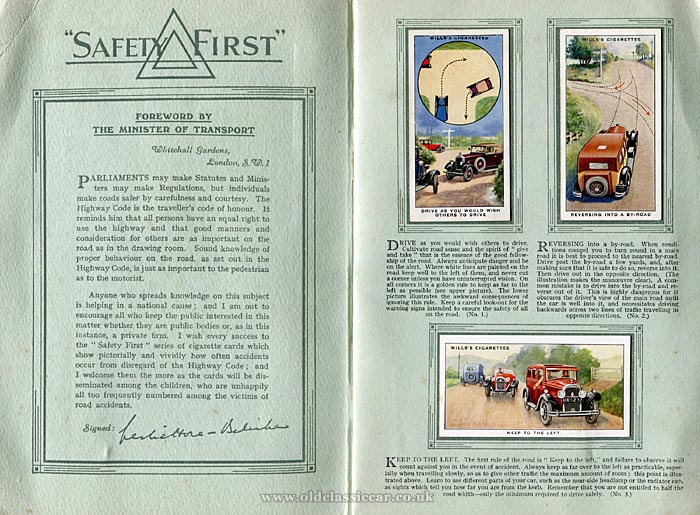Safety First card album.
In the 1930s, smoking was a socially-accepted pastime enjoyed by many, before news filtered through that it might actually not be all that good for you, or the unfortunates who happened to be nearby. To encourage brand loyalty, several of the big names in tobacco - and cigarettes in particular - began to issue collector's cards in their packets. Many subjects were covered, including nature, the Royal family, war, the railways, and - as here - matters related to cars and road transport in general.
|
|
John Players Ltd issued several motoring sets throughout the 1930s (one of which can be found here), while a more recent set that looks to date from the late 1960s, issued by Kensitas, is on this page.
|
|
"Safety First" though was issued by W.D. & H.O. Wills, which was part of Imperial Tobacco. Research suggests that this complete album dates to 1934. There are references within the album's pages to the Road Traffic Act, which was introduced in 1930 and led to the publication of the first Highway Code, in 1931.
|

|
Foreword by the Minister of Transport, Leslie Hore-Belisha.
"Parliaments may make Statutes and Ministers may make Regulations, but individuals make roads safer by carefulness and courtesy. The Highway Code is the traveller's code of honour. It reminds him that all persons have an equal right to use the highway and that good manners and consideration for others are as important on the road as in the drawing room. Sound knowledge of proper behaviour on the road, as set out in the Highway Code, is just as important to the pedestrian as to the motorist."
|
"Anyone who spreads knowledge on this subject is helping in a national cause; and I am out to encourage all who keep the public interested in this matter whether they are public bodies or, as in this instance, a private firm. I wish every success to the "Safety First" series of cigarette cards which show pictorially and vividly how often accidents occur from disregard of the Highway Code; and I welcome the more as the cards will be disseminated among the children, who are unhappily all too frequently numbered among the victims of road accidents.
Signed: Leslie Hore-Belisha"
|

|
|
Facing the Minister of Transport's important message are the first three cards (of fifty in total). "Drive as you would wish others to drive" is the title of card number one, which is as relevant now as it was 80+ years ago, followed by handy tips on reversing into a by-road, and a reminder that in this country we drive on the left - "... failure to observe it will count against you in the event of an accident".
|
|
The cards are a mixture of portrait and landscape, all fully illustrated in colour. The artist's name isn't apparent, it may appear on the reverse of the cards but it doesn't feature anywhere in the album or on the facing side of the cards, which is a shame.
|

|
|
Motoring hints designed to emphasise the key messages of the Highway Code, and the Road Traffic Act, continue over subsequent pages. Most have a relevance today, I wonder whether a future transport minister would ever consider getting involved in a scheme like this today, obviously not via the sale of tobacco products, but in some way reminding road users, pedestrians, and children alike about key road safety messages for the 21st Century?
|

|
|
Collector cards and stickers are still being produced for fans of f**tball, with swaps still taking place to enable collectors to complete their albums. An updated series of cards like this could well prove popular I'd have thought, issued via the sale of more healthy household products. While in-car technology is taking over more of the mundane tasks of motoring, such as parking, switching on lights and wipers, braking and so on, a reminder that the nut behind the wheel still has overall responsibility for the safe execution of their journey, wouldn't seem to be a bad idea.
|
|
A number of cards concentrate on the correct use of hand signals, actions that rarely appear to be used today (apart from by those of us who pilot vehicles of a certain age). Advice on avoiding tramlines, for so long not a feature of British roads, has re-discovered its relevance since many towns and cities have reverted to incorporating tram systems within their public transport plans. Motorcyclists in particular continue to be wary of dropping their wheels into these recessed tracks with good reason.
|
|
Card sets such as this continue to be inexpensive, this set was bought recently for less than a fiver, and give a fascinating insight into motoring years ago. This is especially true for any owners of pre-war vehicles who wish to better understand the environment in which their car, lorry or motorcycle was first used. While first-hand memories of motoring in the 1930s have all-but slipped away now, attractively-illustrated publications such as this shed a welcome light on the trials and tribulations that our motoring forefathers endured, at a time when the adoption of powered road transport by business and private motorists was very much in the ascendancy.
|

|
|
Return to the motor-related trade cards section at oldclassiccar.
|
|
Other items related to the promotion of road safety to be found on Old Classic Car, include a pair of illustrated Disney/Mickey Mouse hankerchiefs from the mid-1960s, and a colouring book produced by Oxo in the 1940s/50s.
|









